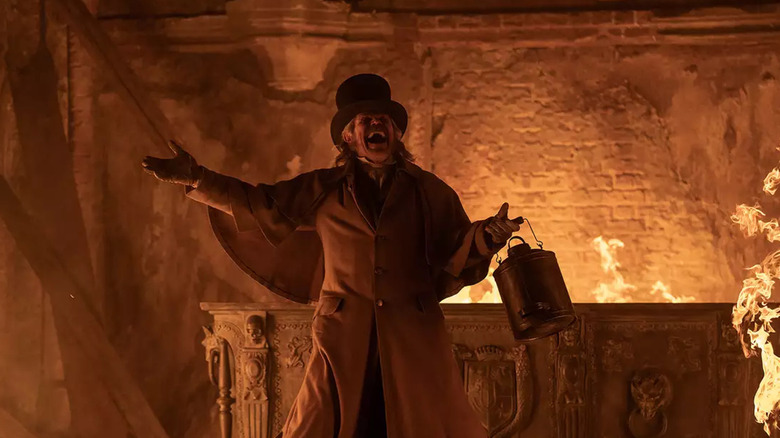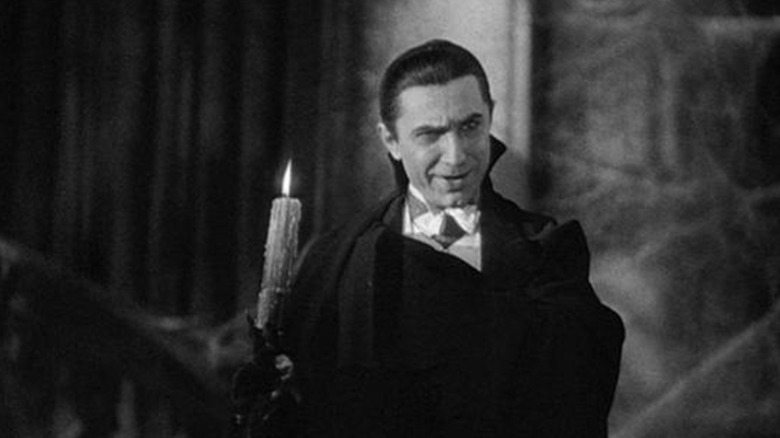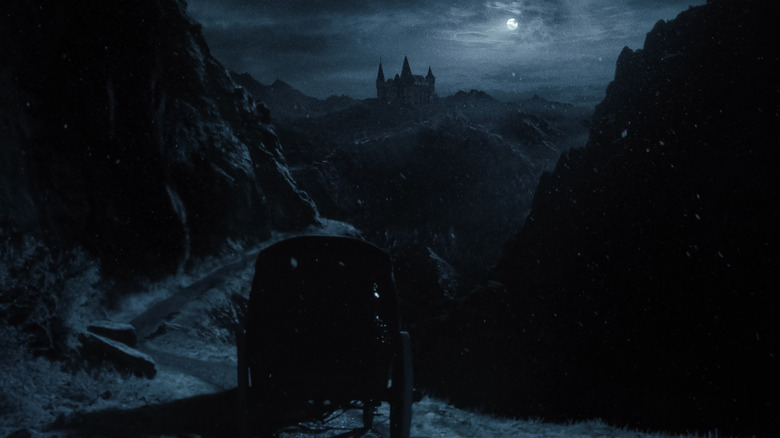What Nosferatu Does Better Than Every Other Recent Dracula Movie
In 2024, we have no need to try and make vampires happen. They have already happened for at least a century, and they're very much still happening: stories about vampires have saturated just about every medium there is. Weirdly, though, we may have to work a little harder to make the vampire happen again — as in the most legendary bloodsucker of all: Dracula.
In fairness, it may not be Dracula himself whose popularity is waning, but rather movies about him. Ever since his screen debut in the lost film "Dracula's Death" in 1921, barely a decade has gone by without some iteration of the Count turning up in cinemas, which is partially why the character has undergone so many various iterations. Like all fictional creations who've been built to last, Dracula endures by embracing change. Yet there can always been too much of a good thing; the last several films to prominently feature the Count have failed to light up critics, fans, or the box office, and that may be because each of these bend the character of Dracula far enough that, well, he doesn't fully feel like Dracula anymore.
This month's "Nosferatu," written and directed by Robert Eggers, would seem like yet another radical take on the character on the face of it — after all, this isn't Dracula per se, but Count Orlok, with Eggers using the name that Henrik Galeen and F. W. Murnau created for their 1922 version of Stoker's novel, changed due to the movie's unauthorized status as an adaptation. Yet Eggers' film isn't looking to set itself apart from prior Draculas; rather, it embraces the character and his history fully, so much so that it very well may be the ultimate "Dracula" movie.
The plight of the Universal Dracula
One of the reasons Dracula's cinematic clout seems to have diminished recently involves his relationship to Universal Pictures. Although the studio doesn't have proprietary ownership of the character, they do tend to act like they do, given how iconic and immortal Bela Lugosi's portrayal of the Count is in Tod Browning's 1931 "Dracula." Universal have gone to great lengths to keep their Dracula active, going so far as to license Hammer Films' 1958 "Dracula" for international distribution. After the initial Universal Monsters cycle and the Hammer cycle had finished running their courses, Universal backed a film version of the then-new adaptation of the original Broadway play that Browning adapted in '31, becoming 1979's "Dracula," directed by John Badham. That same year, Werner Herzog made "Nosferatu the Vampyre," distributed by 20th Century Fox, in which all the Stoker characters had their names reinstated.
During the 1980s, vampires began undergoing an evolution into a more postmodern phase, which left Dracula feeling antiquated and kiddie-like (the character's most major appearance was in 1987's "The Monster Squad"). 1992's "Bram Stoker's Dracula" marked the character's emergence into the more adult '90s, but it was distributed through Columbia, not Universal. After Miramax and New Line Cinema played around with an ultra-modern, hip Dracula in the "Dracula 2000" and "Blade" franchises, Universal tried to bring their Dracula back in 2004 by handing the reins to Stephen Sommers and "Van Helsing," which marks the beginning of their woes in trying to resurrect the character. Although the character never left the silver screen for the next decade, Universal didn't try again until 2014's "Dracula Untold," a movie which would've started their horror cinematic universe franchise, the "Dark Universe," had it not underperformed.
After the "Dark Universe" proper fell apart, too, Universal waited until 2023 to try and bring Dracula back, with the one-two punch of "Renfield" and "The Last Voyage of the Demeter." The films couldn't be more different when portraying the character; Nicolas Cage in "Renfield" is a bad boss/toxic boyfriend with fangs, and Javier Botet in "Demeter" is a mostly animalistic creature feeding on its prey. Audiences didn't connect with an R-rated comedy Dracula nor a gritty monster Dracula, and it's perhaps for this reason why this year's "Abigail," initially pitched as a riff on "Dracula's Daughter," sought to distance itself from the character's name and legacy.
Eggers pays homage to everything from Browning to Hammer to Coppola
With Eggers' "Nosferatu," Universal will finally (hopefully) have the last laugh, as the film is distributed by a division of theirs, Focus Features. Instead of trying to subvert or fully reinvent the character of Dracula, Eggers and actor Bill Skarsgård have decided to make their Count Orlok the most quintessential Dracula yet. That's not to say that the film or the portrayal of Orlok is one big homage or reference; Eggers is too much of an original artist for any such laziness. Really, what he does with "Nosferatu" is much the same thing he's done in his prior films "The Witch," "The Lighthouse" and "The Northman," which is to take elements from a variety of historical and pre-existing sources and use them in a new cinematic stew.
So, for "Nosferatu," those sources are Stoker's novel, various myths about the vampire legend, the actual Transylvania, and of course, the major cinematic "Dracula" features from the last 100-odd years. Present within the film is the chilly starkness of Murnau, the Gothic grandeur of Browning, the Grand Guignol of Hammer, the opulent insanity of Badham, the contemplativeness of Herzog, and the eroticism and theatricality of Coppola. In addition to drawing upon the character's cinematic legacy, Eggers and Skarsgård make Orlok a compellingly ambiguous figure, the better to include as many facets of Dracula as possible in his portrayal. He is a grounded person with his own needs and desires, while also being a supernatural creature whose abilities and influence are terrifyingly powerful. In other words, he's both relatable and loathsome, a combination that makes for a fascinatingly compelling character.
Most importantly, "Nosferatu" doesn't seek to subvert Dracula nor the mythos surrounding him. The film has its own distinct mythology about Orlok's methodology and the way in which he can be defeated, yet this never feels like Eggers winking at the audience or trying to justify an antiquated lore. That's because his "Nosferatu" is a movie made out of a genuine desire to explore the characters and the story's themes, rather than make fun of, or subvert, or start a new franchise from Dracula. It's an honest, creative interpretation, and as it turns out, that's all that Dracula really needed in order to be genuinely scary again.
"Nosferatu" is in theaters everywhere.


